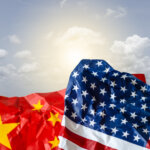Biden and Xi’s meeting will not stop the US-China bilateral tensions from worsening
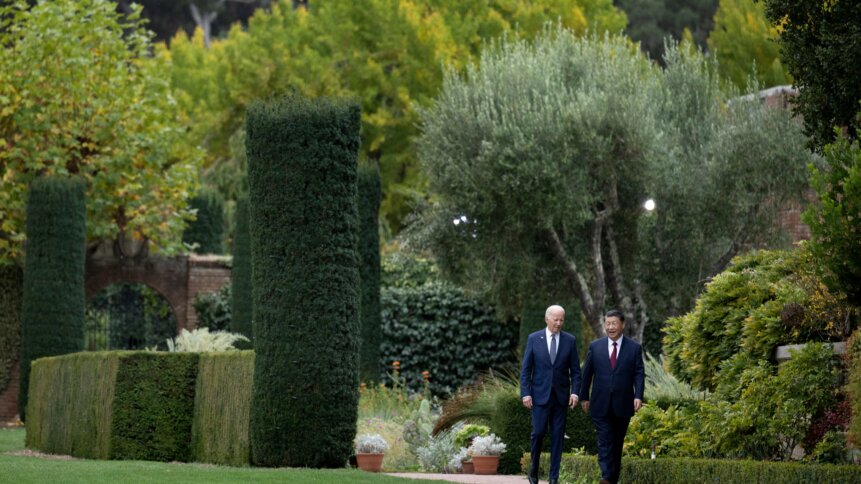
- US-China tensions will intensify in the coming months, stemming from US domestic politics as Biden brandishes his hawkish credentials before the 2024 US elections.
- The two leaders were at fundamental odds on some issues, including the export controls: Xi perceives it as economic strangulation, while Biden views it as a national security concern.
- Both nations agreed to resume military communication, fulfilling a critical American request.
Chinese President Xi Jinping is in the thick of addressing his nation’s economic issues. His archnemesis, President Joe Biden, on the other hand, is facing an upcoming election. Neither of them needs their problems to worsen due to ongoing trade and technology tensions with each other. So, following a turbulent year of US-China tensions, the presidents of both nations met last week, the second time since Biden took office.
Adjacent to the Asia-Pacific Economic Cooperation (APEC) meeting, Biden and Xi gathered at the Filoli estate near San Francisco for a four-hour session. The focus was to prevent a competitive relationship from spiraling into a more contentious confrontation. It was quite an uncommon summit before the US presidential election cycle kicks off in earnest.
But it wasn’t just that. Beijing and Washington also agreed to collaborate on narcotics control and AI while also deciding to resume military-to-military communication. Biden and Xi’s initial summit a year ago in Bali was also aimed at preventing conflict amid intense US-China tensions. Unfortunately, efforts were derailed by a suspected Chinese spy balloon over North America in February this year.
But the sequence of events following Biden-Xi’s summit in Bali unfolded in the summer of this year when the US Secretary of State, Antony J. Blinken’s delayed trip to Beijing took place, initially hindered by the Chinese spy balloon incident. Observing the deepening economic crisis in China, Blinken conveyed a notable eagerness for visits from Treasury Secretary Janet L. Yellen and Commerce Secretary Gina Raimondo.
There were subsequent discreet meetings in Vienna and Washington involving Jake Sullivan, the national security adviser, and his counterpart, Wang Yi. After all, the orchestrated series of interactions was intended to culminate in the four-hour meeting between Biden and Xi at the Filoli mansion on Wednesday, November 15, 2023.
“I value our conversation because I think it’s paramount that you and I understand each other clearly, leader to leader, with no misconceptions or miscommunication. We have to ensure that competition does not veer into conflict,” Biden said in opening remarks as the two delegations faced each other. “The critical global challenges we face, from climate change to counter-narcotics to AI, demand our joint efforts,” Biden urged.
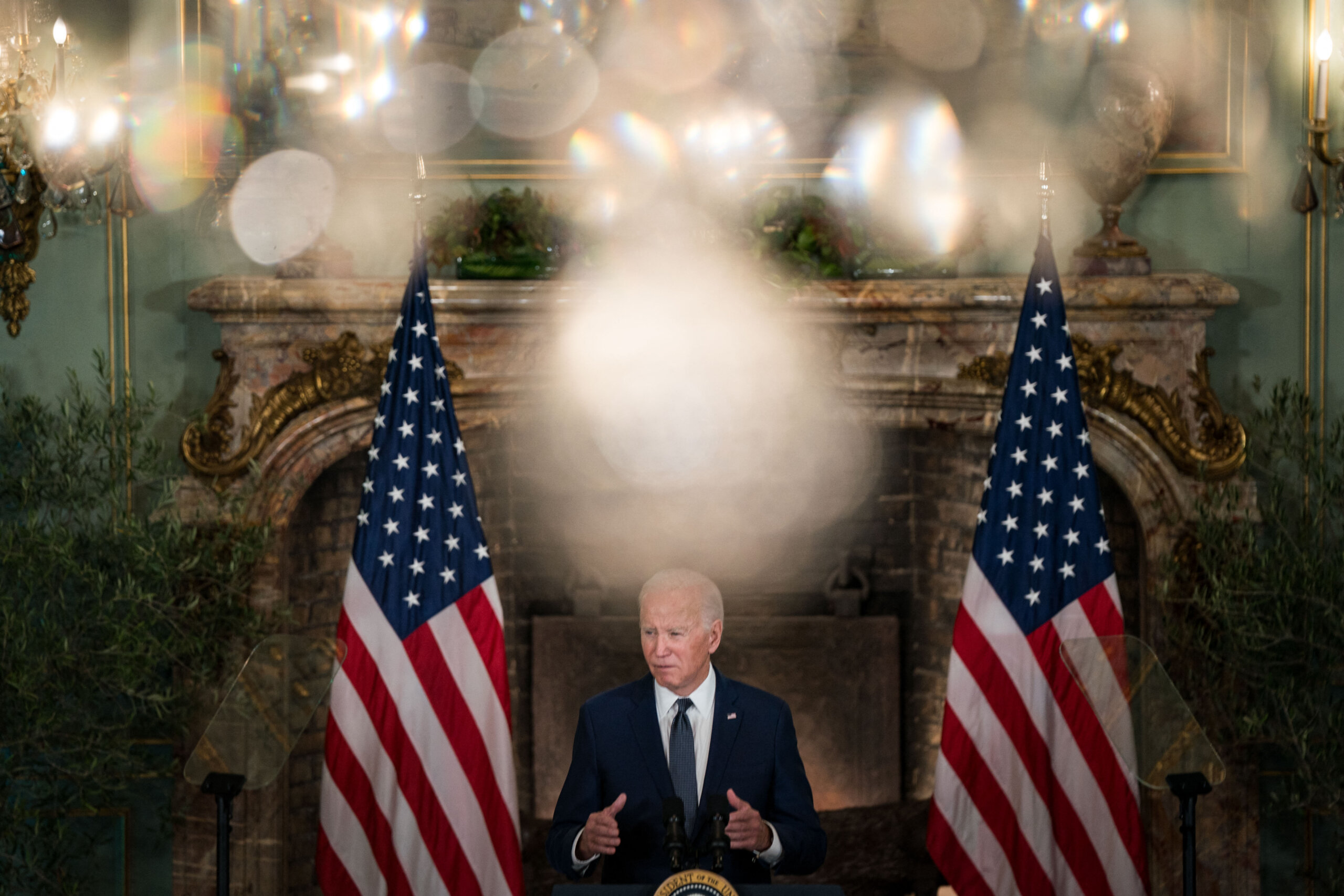
President Joe Biden delivers remarks at a news conference at the Filoli Estate on November 15, 2023 in Woodside, California. The news conference follows a meeting between Biden and Chinese President Xi Jinping during the Asia-Pacific Economic Cooperation (APEC) Leaders’ week, their first since meeting at the Indonesian island resort of Bali in November 2022. Kent Nishimura/Getty Images/AFP (Photo by Kent Nishimura / GETTY IMAGES NORTH AMERICA / Getty Images via AFP).
According to Chinese state broadcaster CCTV, Xi then referenced his first meeting with Biden – in China 12 years ago, when both were vice presidents – and turned quickly to “grave” economic problems, including “protectionism.”
China expressed dissatisfaction with specific US policies that it perceives as heightening US-China tensions, based on its longstanding understanding that Washington aims to impede its progress. These concerns revolve around export controls, investment reviews, and unilateral sanctions.
In fact, Xi, for the first time in the presence of his archnemesis, admitted that the US’ actions “have seriously damaged China’s legitimate interests, suppressing China’s science and technology to curb China’s high-quality development and deprived the Chinese people of their right to development.” Beijing even declared China has no plans to overtake or replace the US, and the latter should not intend to suppress or contain the Eastern powerhouse.
After a meeting with his US counterpart Joe Biden, China’s president Xi Jinping said his country was ready to be a partner and friend of the US and 'will not fight a cold war or a hot war' with any nation. pic.twitter.com/MwPybXtlJE
— Al Jazeera English (@AJEnglish) November 16, 2023
“The global economy is recovering, but its momentum remains sluggish,” Xi added. “Industrial and supply chains are still under the threat of interruption, and protectionism is rising. All these are grave problems.” He then said, “The China-US relationship, which is the most important bilateral relationship in the world, should be perceived and envisioned in a broad context of accelerating global transformations unseen in a century.”
What did Biden and Xi discuss?
“Last time we met in Bali, it was a year and a day ago. A lot has happened since then,” Xi said at the start of his speech in response to Biden’s. He went on to say that for China and the US, shunning each other is impractical. Even remodeling one another is unrealistic, and conflict carries unbearable consequences, Xi said.
“I am still of the view that major-country competition is not the prevailing trend of current times and cannot solve the problems facing China and the United States or the world at large. Planet Earth is big enough for the two countries to succeed, and one country’s success is an opportunity for the other,” he added.
Taiwan
According to various reports that followed the meeting, Xi strongly protested discontinuing the fastest computer chips, emphasizing his concerns. In response, Biden asserted that this measure was essential to prevent potential assistance to the Chinese military. The two leaders disagreed on this matter, with Xi perceiving it as economic strangulation, while Biden viewed it as a national security issue.
Xi also underscored that Beijing’s concerns, especially regarding Taiwan, must be respected. “China has interests that must be safeguarded, principles that must be defended, and bottom lines that must be adhered to,” according to South China Morning Post (SCMP). In highlighting the significance and sensitivity of the Taiwan issue in bilateral relations, Xi emphasized that Washington should fulfill its commitment not to support Taiwan’s independence through tangible actions, and cease providing arms to the island.
Military communication will resume
The two countries agreed to resume military-to-military communication in a step high on Washington’s wish list. “On an issue that the US pushed hard for, the two agreed to resume defense policy coordination talks, meetings under the military maritime consultative agreement, and theater commander talks between the Pentagon and the People’s Liberation Army,” the SCMP noted.
Following a visit to self-governing Taiwan by then-House Speaker Nancy Pelosi last August, China terminated three communication channels. These channels were initially established to prevent inadvertent crises and facilitate resolution tools in case of the worst-case scenario.
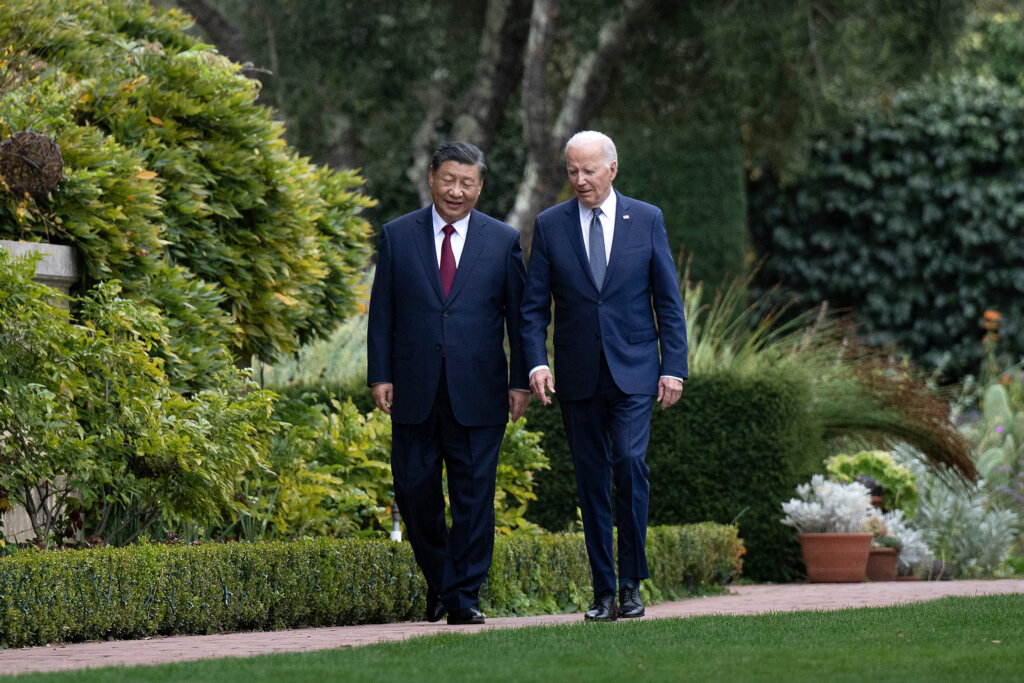
US President Joe Biden (R) and Chinese President Xi Jinping walk together after a meeting during the Asia-Pacific Economic Cooperation (APEC) Leaders’ week in Woodside, California on November 15, 2023. (Photo by Brendan Smialowski / AFP)
“Restoring these military-to-military contacts, and not just at the secretary of defense level, but also at the regional command level and the operational level, is critical to helping to avoid miscalculations and mistakes,” Blinken said in an interview a day after Xi and Biden’s meeting. Restoring these channels might do something to reduce US-China tensions in terms of sliding into armed conflict.
Tackling of fentanyl trafficking
Biden’s aides could also swiftly negotiate a potentially significant agreement, by Chinese diplomatic standards, to halt the flow of chemical precursors for fentanyl to the US. Chinese manufacturing companies are a source of the drug and precursor chemicals that can be combined. Fentanyl is a deadly synthetic opioid.
While this agreement marks a political victory for Biden amid his reelection campaign, showcasing efforts to address the persistent drug crisis, various reports indicate that policy experts remain doubtful about China’s commitment to impact the global supply chain of illicit drugs significantly.
“They question whether Beijing will follow through, or that it is even capable of rooting out shady players within China’s vast chemical industry who use encrypted communications and cryptocurrency while peddling precursor chemicals to Mexican drug traffickers,” an article in The Washington Post reads.
On AI
On AI, both parties agreed to engage in a dialogue to prevent the deployment of this emerging technology in a manner that could disrupt global security, as stated by US officials. As reported by Xinhua news agency, the meeting also resulted in an agreement to collaborate on increasing flights between the two countries next year.
Will US-China ties face more tensions in 2024?
The discussions primarily adhered to the format of their prior meeting in Bali, Indonesia, in November 2022. Biden and Xi commenced with a session involving their key advisers. Present at the talks were Treasury Secretary Janet Yellen, Secretary of State Antony Blinken, and Commerce Secretary Gina Raimondo, along with members of the Chinese delegation, including Finance Minister Lan Fo’an, Commerce Minister Wang Wentao, and Foreign Minister Wang Yi.
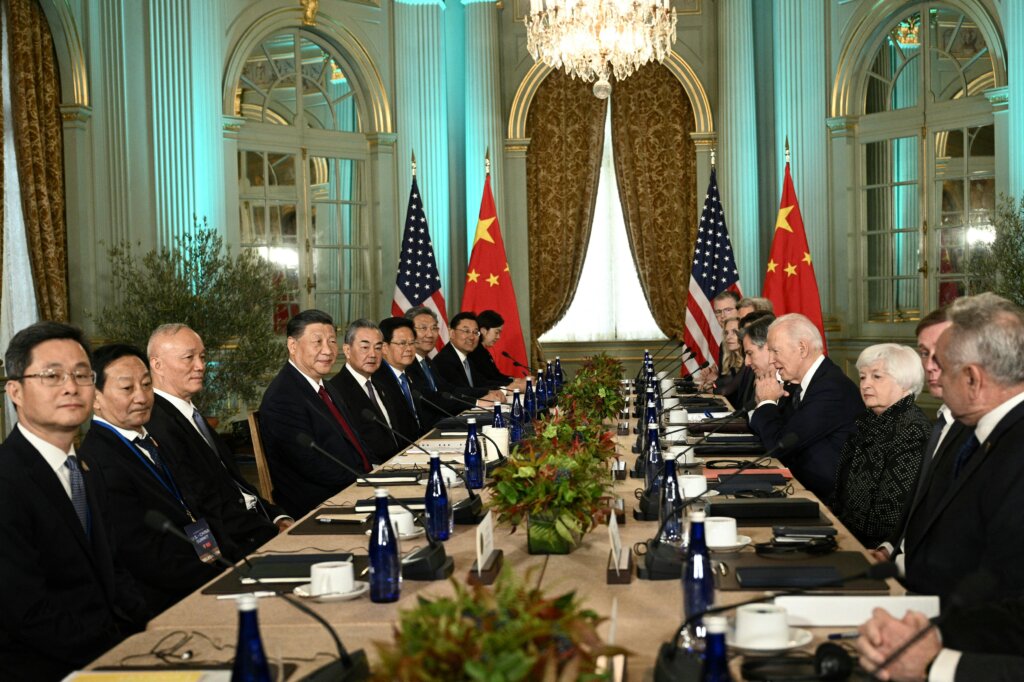
US President Joe Biden meets with Chinese President Xi Jinping during the Asia-Pacific Economic Cooperation (APEC) Leaders’ week in Woodside, California on November 15, 2023. (Photo by Brendan Smialowski / AFP)
Before the meeting, officials from the US and China engaged in discussions to outline the agenda and structure of the event. Aides acknowledged that every detail of the visit would be closely scrutinized. The Economist Intelligence Unit (EIU) said it expects the engagement to inject some near-term stability into bilateral ties, but not to tackle increasingly long-term US-China tensions..
“The meeting will support a cyclical upswing in US-China ties and reduce some trade and geopolitical risks,” the EIU said, noting that it will, however, not be sufficient to arrest the structural downward trajectory of the relationship. The EIU’s assessment reflects the deep levels of mistrust on both sides, which the presidential engagement did not resolve. There were, nevertheless, several areas of agreement that aligned with EIU’s expectations.
EIU also believes that the inability to find common ground on China’s relationship with Taiwan—or to address China’s opposition to US technology export restrictions, investment screening measures, and sanctions—will cause these topics to remain areas of tension. Similarly, there was no discernible progress regarding China’s support for Russia or its position on the Hamas-Israel war.
“US-China ties will face several tests in the coming months. Some of these stem from US domestic politics as Biden brandishes his hawkish credentials before the 2024 US elections; at a press conference at the end of the meeting, Biden, in an off-the-cuff remark, referred to Xi as a “dictator,” a label he used last year, which evoked a strong reaction from China,” EIU highlighted.
Although the summit will restore crucial communication channels and help avoid unintended conflict, EIU expects bilateral relations to remain fragile in 2024. “Additional restrictions targeting China’s technology sector (or its electric vehicles) are likely, given US domestic criticism over the ineffectiveness of the current controls, while China’s response to the upcoming Taiwanese elections—which the US will also be watching closely (and responding to)—could yield another period of diplomatic volatility,” it added.







